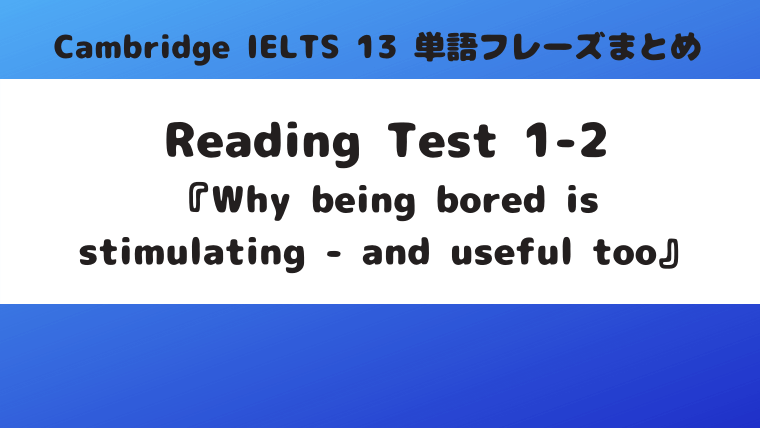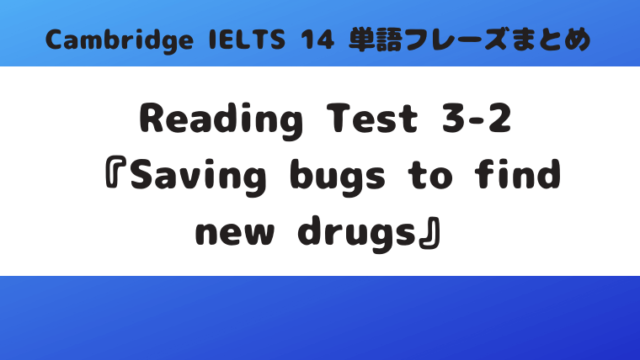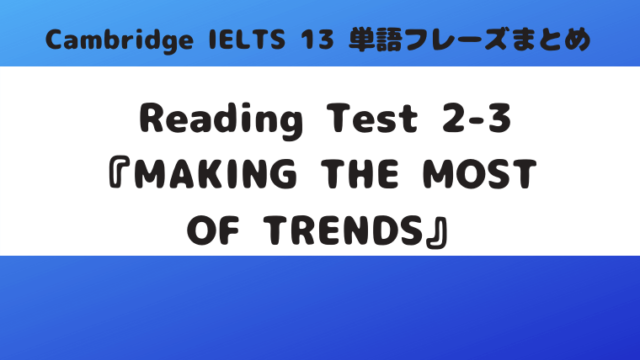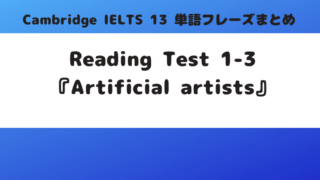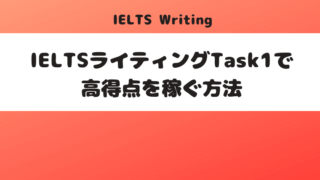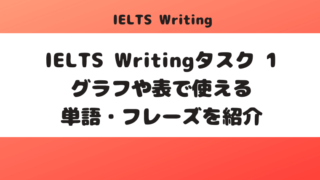「Cambridge IELTS 13」Reading Test1-2『Why being bored is stimulating – and useful too』(p.21)の単語・フレーズの単語・フレーズをまとめました。
私がIELTS Readingの単語・まとめを行う理由は「Cambridge IELTS Reading単語・フレーズまとめ」からご覧ください。
Reading Test 1 Passage 2:Why being bored is stimulating – and useful too
- keep on
UK /kiːp/ US /kiːp/
UK informal
to continue to talk in an annoying way about something:
1 keep on, keep on doing something (<…>し)続ける
同意 continue
2 keep on doing something 繰り返し[何度も]<…>する, しょっちゅう<…>してばかりいる
3 keep on (keep on going とも 米) (一定方向に) 進み続ける
4 keep somebody on <人>を雇い続ける
同意 retain - stretch out [句動詞]
1 be stretched out 寝そべっている
2 stretch something ↔ out <手・腕・脚など>を伸ばす
3 stretch something ↔ out <…>を引き延ばす, 長引かせる
4 stretch out 〘インフォーマル〙 横になる - boredom
noun [ U ]
UK /ˈbɔː.dəm/ US /ˈbɔːr.dəm/
the state of being bored:
退屈, 倦怠(けんたい), うんざりした気分
(実践IELTS英単語3500:1795) - apathy
noun [ U ]
UK /ˈæp.ə.θi/ US /ˈæp.ə.θi/
behaviour that shows no interest or energy and shows that someone is unwilling to take action, especially over something important:
無関心, 無気力 - depression
noun
UK /dɪˈpreʃ.ən/ US /dɪˈpreʃ.ən/
・the state of feeling very unhappy and without hope for the future:
・a mental illness in which a person is very unhappy and anxious (= worried and nervous) for long periods and cannot have a normal life during these periods:
・a period in which there is very little business activity and not many jobs:
・an area where the air pressure is low:
・part of a surface that is slightly lower than the rest:
1 《C, U》 憂鬱(ゆううつ), 沈鬱さ, ふさぎ込み
2 《U》 鬱(うつ) 病, 抑鬱症
3 《C, U》 不況, 不景気
4 the (Great) Depression (1930年代の) (世界)大恐慌
5 《C》 くぼみ, へこみ
6 《C》 〘専門〙 低気圧
(実践IELTS英単語3500:1979) - indifference
noun [ U ]
UK /ɪnˈdɪf.ər.əns/ US /ɪnˈdɪf.ɚ.əns/
lack of interest in someone or something:
無関心, 無頓着(とんちゃく) - restless
adjective
UK /ˈrest.ləs/ US /ˈrest.ləs/
unwilling or unable to stay still or to be quiet and calm, because you are worried or bored:
1 落ち着かない, そわそわした
2 変化を求める, じっとしていない
3 《名の前でのみ》 a restless night / sleep
眠れぬ夜[浅い眠り] - disgust
noun [ U ]
UK /dɪsˈɡʌst/ US /dɪsˈɡʌst/
a strong feeling of disapproval and dislike at a situation, person’s behaviour, etc.:
verb [ T not continuous ]
UK /dɪsˈɡʌst/ US /dɪsˈɡʌst/
to make you feel extreme dislike or disapproval:
(名)
1 嫌悪, 反感
2 (生理的な) むかつき, 気持ち悪さ
(動)
1 <人> に嫌悪[反感]を抱かせる, をうんざりさせる, むかつかせる
2 <人> に吐き気を催させる, を気持ち悪くさせる - distinct
adjective
UK /dɪˈstɪŋkt/ US /dɪˈstɪŋkt/
・clearly noticeable; that certainly exists:
・clearly separate and different (from something else):
1 〘フォーマル〙 別個の, 別々の, 別種の
2 まったく異なった, 対照的な, 独特の
3 はっきりとわかる, すぐに気づく
4 《名の前でのみ》 明らかな, 疑う余地のない
(実践IELTS英単語3500:1495) - calibrate
verb [ T ] ENGINEERING, SCIENCE specialized
UK /ˈkæl.ɪ.breɪt/ US /ˈkæl.ə.breɪt/
・to mark units of measurement on an instrument such so that it can measure accurately:
・to check a measuring instrument to see if it is accurate
1 <計器など> を調整する
2 <計器など> に目盛りをつける - reactant
noun [ C ] CHEMISTRY specialized
UK /riˈæk.tənt/ US /riˈæk.tənt/
a substance that is part of a chemical reaction
(化学反応における) 反応物→ product - apathetic
adjective
UK /ˌæp.əˈθet.ɪk/ US /ˌæp.əˈθet̬.ɪk/
showing no interest or energy and unwilling to take action, especially over something important:
やる気のない, 無関心の - plot
verb
UK /plɒt/ US /plɑːt/
・to mark or draw something on a piece of paper or a map
・to make marks to show the position, movement, or development of something, usually in the form of lines or curves between a series of points on a map or piece of paper:
・to make a secret plan to do something wrong, harmful, or illegal:
・to make a secret plan to do something funny or enjoyable to or for someone:
・to write the plot for something:
1 a) 《他》 <政府転覆・暗殺など> を企てる, たくらむ
b) 《自》 陰謀[策略]を企てる
2 《他》 (plot out とも) <グラフ・線など> をかく
3 《他》 (plot out とも) (地図などに) <航路・経路など> を記入する
4 《他通例受け身形で》 <本・劇・映画など> の筋(立て)を練る
(実践IELTS英単語3500:1088) - arousal
noun [ U ]
UK /əˈraʊ.zəl/ US /əˈraʊ.zəl/
・sexual excitement:
・the causing of strong feelings or excitement in someone:
1 性的興奮
2 (感情などの) 目覚め - explosive
adjective
UK /ɪkˈspləʊ.sɪv/ US /ɪkˈsploʊ.sɪv/
・exploding or able to explode easily:
・very loud and sudden, like an explosion:
1 爆発(性)の
2 <気性などが> 激しやすい, <状況・問題などが> 一触即発の
3 <増加・成長などが> 急激な
4 <音などが> 爆発のような
(実践IELTS英単語3500:1735) - be prone to sth/do sth
likely to suffer from an illness or show a particular negative characteristic:
<望ましくないことなど>をしがちな, しやすい, になりやすい
<…>しがちである
(実践IELTS英単語3500:2568) - polystyrene
noun [ U ]
UK /ˌpɒl.ɪˈstaɪ.riːn/ US /ˌpɑː.lɪˈstaɪ.riːn/
a light, usually white plastic used especially for putting around delicate objects inside containers to protect them from damage, or for putting around something to prevent it from losing heat:
ポリスチレン, スチロール樹脂 同意 Styrofoam 〘商標〙 - wander
verb
UK /ˈwɒn.dər/ US /ˈwɑːn.dɚ/
・to walk around slowly in a relaxed way or without any clear purpose or direction:
・If someone’s hands or eyes wander, they touch or look in many different places, especially in a sexual way or when they should not do this:
・to have sexual relationships or experiences outside of your marriage or usual relationship:
・to start talking about a different subject from the one you were originally discussing:
・If your mind or your thoughts wander, you stop thinking about the subject that you should be giving your attention to and start thinking about other matters:
・If you say that an old person’s mind is beginning to wander, you mean that they are starting to get very confused because of their age:
1 a) 《自》 (当てもなく) 歩き回る, ぶらつく, 放浪する
wander around / through something
<場所>のあちこち[<場所>じゅう]をさまよう
b) 《他》 <場所> を歩き回る, 放浪する
同意 roam
2 《I always + adverb/preposition》 wander in / out / off
ぶらりと入って来る[出て行く,立ち去る]
同意 amble
3 《自》 (場所から) いなくなる, ふらっとどこかへ行く
4 《自》 (退屈・心配などで) <心が> ついほかのことに向く, <注意が> 散漫になる, <考えが> とりとめなくなる
5 《自》 (主題から) 話を脱線させる
6 a) 《自》 <目・視線が> きょろきょろ見回す
b) 《他》 …をきょろきょろ見回す
7 《I always + adverb/preposition》 wander through / across / along something
<道・川などが> 曲がりくねりながら<場所>の中を[を横切って,に沿って]続く
8 《自》 <男性の手が> (嫌がる女性の体などを) まさぐる}
(実践IELTS英単語3500:887) - adaptive
adjective BIOLOGY specialized
UK /əˈdæp.tɪv/ US /əˈdæp.tɪv/
having an ability to change to suit different conditions
適応[順応]性のある - put into gear
〔車の〕ギアを入れる
準備を整える、調子に乗る、軌道に乗る - worryingly
adverb
UK /ˈwʌr.i.ɪŋ.li/ US /ˈwɝː.i.ɪŋ.li/
in a way that makes you feel worried:
心配して,気がもめて;やっかいに
(実践IELTS英単語3500:) - proneness
proneness to sth
the fact of being likely to suffer from an illness or have a particular negative characteristic:
<望ましくないことなど>への傾向, 性向
同意 tendency - detrimental
adjective formal
UK /ˌdet.rɪˈmen.təl/ US /ˌdet.rəˈmen.t̬əl/
causing harm or damage:
有害な, 不利益な
同意 harmful
(実践IELTS英単語3500:3043) - bore
verb
UK /bɔːr/ US /bɔːr/
to talk or act in a way that makes someone lose interest:
1 《他》 <人> をうんざりさせる, 退屈させる
2 a) 《I always + adverb/preposition》 bore through / into something
<…>に穴を通す[掘る]
b) 《T always + adverb/preposition》 bore something through / into something
<穴・トンネルなど>を<…>に通す[開ける]
(実践IELTS英単語3500:702) - threshold
noun
UK /ˈθreʃ.həʊld/ US /ˈθreʃ.hoʊld/
the floor of an entrance to a building or room
1 the threshold 敷居, 入り口, 玄関口
2 (反応を起こす) 限界, 境界, (心理学で) 閾(いき)
3 基準, 水準
4 〘専門〙 (滑走路の) 末端 - speculate
verb [ I ]
UK /ˈspek.jə.leɪt/ US /ˈspek.jə.leɪt/
・to guess possible answers to a question when you do not have enough information to be certain:
・to buy and sell in the hope that the value of what you buy will increase and that it can then be sold at a higher price in order to make a profit:
1 a) 《自》 憶測する, (当て)推量する
b) 《他》 …と憶測する
2 《自》 投機する
(実践IELTS英単語3500:2283) - overestimation
verb [ I or T ]
UK /ˌəʊ.vəˈres.tɪ.meɪt/ US /ˌoʊ.vɚˈes.tə.meɪt/
to think that something is or will be greater, more extreme, or more important than it really is:
1 高すぎる[多すぎる]見積もり
2 過大評価
